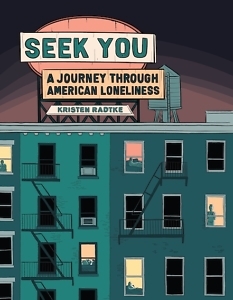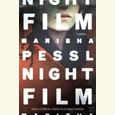Limning the Condition of Loneliness
Kristen Radtke’s Seek You considers our solitary era
Our Covid quarantines have been a boon to homebodies and loners. We’ve hunkered down with Hilary Mantel’s Cromwell trilogy, caught up on Endeavour and Mare of Easttown, knitted shawls and puttered around in the basement woodshop. But solitude breeds loneliness and occasionally contempt, as Kristen Radtke explores in her new graphic nonfiction book, Seek You, which yearns to peel back, through searching storytelling and exquisite line drawings, what she’s learned. Her book is a valuable tool as we continue to grapple with the pandemic.

Raised in Wisconsin, Radtke was drawn to her father’s hobby of amateur radio. The book’s title is derived from “CQ,” an Anglicization of a French radio term. Only later did she recognize his obsession as an expression of loneliness. She smartly contrasts loneliness with “aloneness,” which can be a healthy reflective state, even creative. Her panels — often spare, with single figures floating through voids of space and ocean — tease out her themes. Her assured line drawings, eye for composition, and borrowing from photography enhance her investigation.
The book’s strongest sections detour into larger arcs, among them the technology of laugh tracks and personal websites. There’s a sobering set piece on a narcissistic University of Wisconsin professor and a beautiful riff on Casey Kasem’s “American Top Forty.”
 Seek You braids the science of loneliness, from extensive experiments to recent discoveries, with her personal history. Radtke writes candidly about nomadic treks from the Midwest to New York, where she banged hard against “the inescapability of other people … [where] strangers invade the monasteries of our minds.” She also depicts another American city, Las Vegas, with brio; her illustrations sketch the city she found beneath the façade of casino lights and hotel marquees. At her best, Radtke mirrors the country’s post-Trump anomie with her own aching loneliness, illuminating a lifetime of mental struggles with candor.
Seek You braids the science of loneliness, from extensive experiments to recent discoveries, with her personal history. Radtke writes candidly about nomadic treks from the Midwest to New York, where she banged hard against “the inescapability of other people … [where] strangers invade the monasteries of our minds.” She also depicts another American city, Las Vegas, with brio; her illustrations sketch the city she found beneath the façade of casino lights and hotel marquees. At her best, Radtke mirrors the country’s post-Trump anomie with her own aching loneliness, illuminating a lifetime of mental struggles with candor.
But the book has an Achilles’ heel: Its second half doggedly erases the interior lives of men, reducing their emotional realities to those of TV characters, such as Mad Men’s Don Draper and The Wire’s McNulty. Radtke recounts her rage toward ex-boyfriends and even her husband, who’d purchased a couple of guns before they met and stored them, unused, in her brother’s garage “ten states away. … [His] answers to me, when I ask him every few months why he would buy a gun, coming to him angry because I’ve been running over this recollection for hours, are insufficient.” And she tilts the science away from current research on hormones and primate evolution. Regrettably, this binary of men as predatory ogres and women as sanctified victims mars an otherwise fascinating book.
And yet despite its gender stereotypes, Seek You probes the character of American loneliness in bold, uncharted ways. From Art Spiegelman’s groundbreaking Maus 30 years ago, graphic literature has exploded, pushing the envelope of traditional narrative. On balance, Seek You is a valuable contribution to an emerging form that daringly marries words to pictures, evoking pictograms, the earliest writing, in a book that comes full circle through the ages, limning the condition of loneliness as a constant source of agony and ecstasy, and perhaps something we all may need.

Hamilton Cain is the author of This Boy’s Faith: Notes from a Southern Baptist Upbringing and a frequent reviewer for O, the Oprah Magazine; the Minneapolis Star Tribune; and The Barnes & Noble Review. A native of Chattanooga, he lives in Brooklyn, New York.


